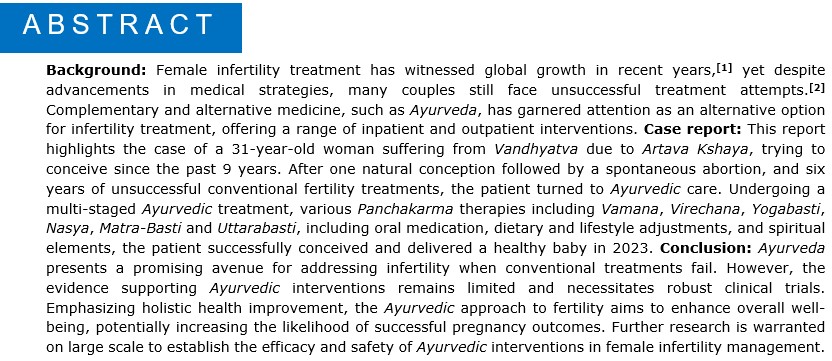A case report on Ayurvedic management in Secondary Infertility due to Artava Kshaya
DOI:
https://doi.org/10.21760/jaims.9.5.47Keywords:
Secondary Infertility, Artava Kshaya, Uttarabasti, InfertilityAbstract
Background: Female infertility treatment has witnessed global growth in recent years,[1] yet despite advancements in medical strategies, many couples still face unsuccessful treatment attempts.[2] Complementary and alternative medicine, such as Ayurveda, has garnered attention as an alternative option for infertility treatment, offering a range of inpatient and outpatient interventions. Case report: This report highlights the case of a 31-year-old woman suffering from Vandhyatva due to Artava Kshaya, trying to conceive since the past 9 years. After one natural conception followed by a spontaneous abortion, and six years of unsuccessful conventional fertility treatments, the patient turned to Ayurvedic care. Undergoing a multi-staged Ayurvedic treatment, various Panchakarma therapies including Vamana, Virechana, Yogabasti, Nasya, Matra-Basti and Uttarabasti, including oral medication, dietary and lifestyle adjustments, and spiritual elements, the patient successfully conceived and delivered a healthy baby in 2023. Conclusion: Ayurveda presents a promising avenue for addressing infertility when conventional treatments fail. However, the evidence supporting Ayurvedic interventions remains limited and necessitates robust clinical trials. Emphasizing holistic health improvement, the Ayurvedic approach to fertility aims to enhance overall well-being, potentially increasing the likelihood of successful pregnancy outcomes. Further research is warranted on large scale to establish the efficacy and safety of Ayurvedic interventions in female infertility management.
Downloads
References
Sun, H., Gong, T. T., Jiang, Y. T., Zhang, S., Zhao, Y. H., & Wu, Q. J. (2019). Global, regional, and national prevalence and disability-adjusted life-years for infertility in 195 countries and territories, 1990-2017: results from a global burden of disease study, 2017. Aging, 11(23), 10952–10991. https://doi.org/ 10.18632/aging.102497
Smith, J. F., Eisenberg, M. L., Millstein, S. G., Nachtigall, R. D., Sadetsky, N., Cedars, M. I., Katz, P. P., & Infertility Outcomes Program Project Group (2011). Fertility treatments and outcomes among couples seeking fertility care: data from a prospective fertility cohort in the United States. Fertility and sterility, 95(1), 79–84. https://doi.org/10.1016/j.fertnstert.2010.06.043
Zegers-Hochschild, F., Adamson, G. D., de Mouzon, J., Ishihara, O., Mansour, R., Nygren, K., Sullivan, E., Vanderpoel, S., International Committee for Monitoring Assisted Reproductive Technology, & World Health Organization (2009). International Committee for Monitoring Assisted Reproductive Technology (ICMART) and the World Health Organization (WHO) revised glossary of ART terminology, 2009. Fertility and sterility, 92(5), 1520–1524. https://doi.org/10.1016/j.fertnstert. 2009.09.009
Katole, A., & Saoji, A. V. (2019). Prevalence of Primary Infertility and its Associated Risk Factors in Urban Population of Central India: A Community-Based Cross-Sectional Study. Indian journal of community medicine : official publication of Indian Association of Preventive & Social Medicine, 44(4), 337–341. https://doi.org/ 10.4103/ijcm.IJCM_7_19
Kaviraj Ambikadutta S. Sushruta Samhita of n Sushruta, Sharira Sthana. Reprint edition. Ver. 35, Ch. 2. Varanasi: Chaukhamba Sanskrit Sansthana; 2012. p. 19.
Balat, G., Dei, L., Donga, S., & Bhagora, T. (2019). Effect of Brihatyadi Yapana Basti and Shivalingi (Bryonia laciniosa Linn.) seed powder in the management of female infertility (Vandhyatva) due to anovulatory factor: An open-labelled randomized clinical trial. Ayu, 40(4), 216–222. https://doi.org/10.4103/ayu.AYU_123_18
Aparna S, Maya Balakrishnan, Giby Thomas. Role of Nasya in the Management of Dysfunctional Uterine Bleeding - A Review. International Journal of Ayurveda and Pharma Research. 2021;9(2):68-71.















